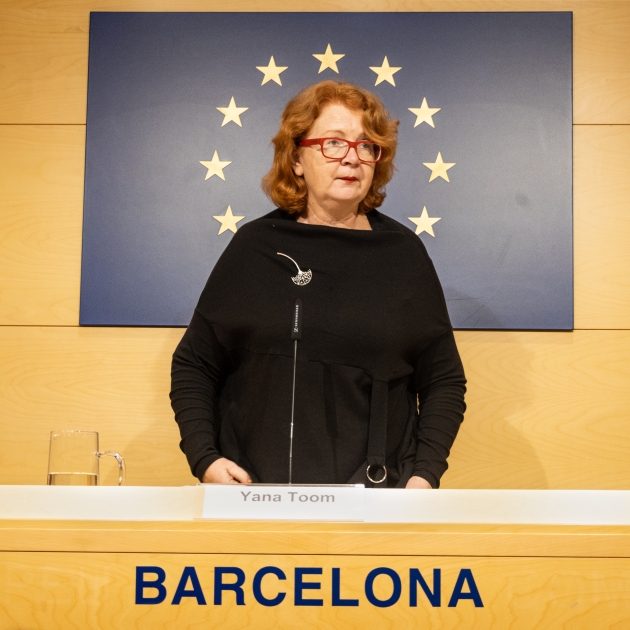The group of visiting MEPs concluded their mission to Catalonia to examine language immersion this Wednesday. An assignment that many in the Catalan language community have denounced as politically instrumentalized given that it was instigated by the Spanish right (People's Party, Vox and Ciudadanos) following a request by Ana Losada, the president of the Spanish-nationalist oriented Asamblea por una Escola Bilingüe (AEB). The vice-chair of the Petitions Committee of the European Parliament and representative of Estonia, Yana Toom, who headed the delegation of MEPs, appeared on the final day before the media to assess the experience. Her appearance was further evidence of the political bias that exists, since on several occasions she reproduced the usual Spanish nationalist arguments in rejection of Catalan linguistic immersion.
At the outset, Yana Toom emphasized that the mission had been "authorized" by the president of the European Parliament, Roberta Metsola, and had taken action to ensure that the delegation had a "plural" representation across the ideological spectrum. This, despite the group which travelled to Catalonia consisting of only six members of the over 60 MEPs in the Petitions Committee, and, specifically, all six of them from the European political groups of the right, the far-right and the liberals, since the other parties (from the social democrats to the greens and the left) had boycotted the mission because of its partisanship. But the MEP spokesperson affirmed that the delegation was "extremely transparent" and assured that people should not seek a "conspiracy" behind it.
With regard to the meetings that took place over the three days of the visit, Toom showed her position of support for the families who have called for an end to the Catalan language immersion system. According to figures from the Catalan government, a total of fifty families have sought to impose the court-backed measure of a Spanish language quota of 25% classroom time in schools. However, the MEPs met with several of these families, while bypassing the defenders of the model. The vice-chair of the committee explained that applying the ruling of the Catalan High Court to centres "does not mean replacing Catalan", and regretted that parents are "forced" to go individually to the court to request the application of the Spanish percentage in classrooms. "This causes social exclusion, intimidation and school bullying", she stated, the same accusation as made by Spanish nationalists.
In the same vein, Toom highlighted that some representatives of Spanish justice have explained that some parents are victims of "hate speech" and have suffered attacks on social media. This is the case of the father who asked to apply the 25% quota to a school in Canet de Mar, who met with MEPs on Monday, and who took some Twitter users to court over the messages they sent him. The PETI committee deputy chair also expressed her doubt as to whether the number of people who want to impose Spanish in the classrooms is really at the level that the Catalan administration says, arguing that if she were to put herself in the place of a mother "who has to go through a picket" of parents defending language immersion "I doubt I would go to court" for fear of possible reprisals.
Immersion advocates 'don't give data'
On the other hand, and with reference to the meetings held by the MEPs with the defenders of immersion, Toom stressed that the Fundació Bofill (the educational organization that delivered a rigorous report, published in English in ElNacional.cat) "was not able to give data" when it argued that the recent poor academic results from Catalan students in the PISA tests is due to socio-economic reasons, and not to the vehicular nature of Catalan. The MEP also referred to the meeting with the Catalan education minister, Anna Simó. The minister denounced this Tuesday that the mission had arrived in Catalonia "having brought their thesis with them", and Toom replied that Simó had left "many questions unanswered" and had not offered "updated data" to explain that Catalan in the classrooms slows down school segregation.
And regarding the visits to schools, Toom said that the school principals were not able to express themselves freely because on some occasions the administrative representatives who accompanied them spoke for them. In fact, with reference to the institutional positions, the MEP compared her words with the way the affected families expressed themselves. "When you meet the petitioners and talk to these people, you see their real emotions, and then you meet the officials who deny the problem, it's not a good picture," she criticized.
The conclusions, in three months
The Petitions Committee will now draft its report with the conclusions of the mission on linguistic immersion. According to Toom, there is still data to be collected for this final document. The findings and recommendations will be known in about three months and the official document will be published. In any case, on a subject on which, as the European Commission has repeatedly said, the competence belongs to the member state concerned, the text will not be binding.
